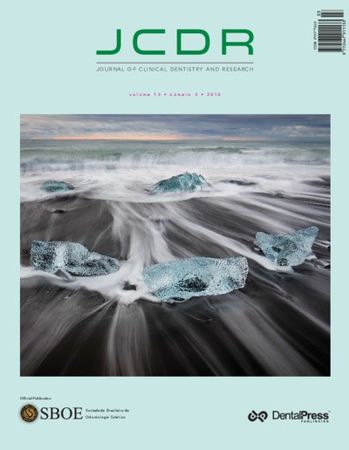Influence of post-curing method on cure efficiency and roughness of direct resin composites in indirect restorations
Artigo Original
Objective: To evaluate the influence of different post-curing methods on cure efficiency and surface roughness of direct composite resins in indirect restorations compared to the conventional light-curing protocol. Material and Methods: Two direct composite resins, one nanofilled (Filtek Z350, 3M/ESPE) and one micro- hybrid (Amelogen, Ultradent), were used to obtain specimens (d = 4 mm, 2-mm thick) via different curing methods (n = 10). All specimens were light-cured at 48 J/cm2 (conventional-control), then subjected to a post-curing method: microwave post-curing or autoclave post-curing...
Autores: Jamille Favarão, Ronaldo Hirata, Dayane Carvalho Ramos Salles De Oliveira, Eduardo José Souza Junior, Adam Lee Dobson, Mário Alexandre Coelho Sinhoreti, Regina Maria Puppin Rontani,






In all areas of knowledge, and particularly in health areas, in which Dentistry is included, there are people that stand out due to several qualities
Leia mais
Improper use of teeth speeds the process of aging up, leads to changes relative to color and shape, and modifies the morphological, imaging and biological characteristics of the pulp-dentin complex. Rapidly aged pulp has its reparative, reactional and defensive abilities decreased. This should be taken into account whenever assessing restoration and other surgical procedures planning, in which case the following doubt arises: should endodontic treatment be carried out or will the dental pulp...
Leia mais
To my mind, writing this column is such great responsibility, for columns are often published after a limited or nonexistent peer review. Thus, words must be carefully weighed, aiming at the best for our profession and, above all, for patients in general. Columns in academic journals normally consist of pseudo- philosophical texts that present a narrow and polarized view, which is self-centered on a particular topic on Odontology or Medicine, in which authors tend to register their own...
Leia mais
The aim of this column is to promote reflection and lead the reader to some important considerations on the choice of restorative materials in cases of esthetic restorations – actually, considering clinical criteria for the choice between ceramics and composite resins.
Leia mais
Composite resin restorations are still important for dentistry due to a number of factors. In order to obtain better results, the clinician should always evaluate its correct indication, treatment planning and execution. All of these steps must be strictly followed and enforced with the minimum details to obtain not only aesthetic results, but also long term stability. The present article shows an important stage of planning to get a more predictable and natural result. Diagnostic wax-up when...
Leia mais
The aim of this article is to present the case of a patient with gingival smile and dentogingival discrepancy who was treated with resective gingival surgery and the application of botulinum toxin type A. Methods: Resective gingival surgery (gingivoplasty) and the application of botulinun toxin type A were performed. Results: Resective gingival surgery (gingivoplasty) increased the dental zenith and provided dental, gingival and facial proportion; while the application of botulinum toxin...
Leia mais
Objective: Assess the aesthetic perception of dental undergraduate students and lay people. Methods: The sample consisted of 50 lay people and 50 undergraduate students. Data were collected by means of forms with questions and images, then they were tabulated and subjected to descriptive statistics. Results: For lay people, teeth alignment, color and shape were the major complaints. Regarding deviation, 28 (56%) considered as ideal a smile without midline deviation. A smile with coincident...
Leia mais
ntroduction: After tooth loss, bone resorption emerges, which most often results in defects of the alveolar ridge, thus hindering dental implant placement. Bone gain in these regions is a great challenge, especially in terms of height gain. Objective: In this sense, the present study reports a case that shows the posterior ridge of the mandible with insufficient height for conventional dental implants placement. With a view to readjusting this ridge, the treatment of choice was segmental...
Leia mais
Objective: To evaluate the influence of different post-curing methods on cure efficiency and surface roughness of direct composite resins in indirect restorations compared to the conventional light-curing protocol. Material and Methods: Two direct composite resins, one nanofilled (Filtek Z350, 3M/ESPE) and one micro- hybrid (Amelogen, Ultradent), were used to obtain specimens (d = 4 mm, 2-mm thick) via different curing methods (n = 10). All specimens were light-cured at 48 J/cm2...
Leia mais
Abstract: This paper presents a creative alternative to restore function and esthetics of a tooth with hidden caries. A bis-acrylic resin occlusal replica was manufactured prior to preparation. The composite resin restoration was quickly manufactured using this replica, preserving the original anatomic shape of the occlusal surface. The step-by-step treatment procedures are presented, from the clinical diagnosis to replica manufacturing, carious tissue removal, composite resin placement,...
Leia maisCopyright © 1998 - 2022 DentalGO | Todos Direitos Reservados. DentalGO é uma marca Dental Press